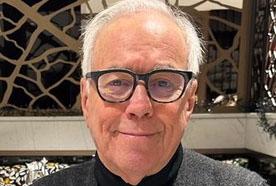
20 Dec David J. Schoonmaker
David J. Schoonmaker, Class of 1962
March 16, 1944 – December 15, 2022
We are deeply saddened at the news of passing of Distinguished Alumnus David J. Schoonmaker at age 78 on December 15, 2022. He is survived by his wife Eva of Denver; brother Marlin of Seattle; son Sean, daughter-in-law Liisa, and grandson Rowan of Oakland; and son Allen, daughter-in-law Jennifer, and grandchildren Alexander and Alyssa of Hong Kong.
David is the eldest son of Dr. Joseph Schoonmaker MD. His father was a medical missionary in Assam, India, after serving as a Chaplain in WWII. David came to Woodstock in 1955 and graduated in 1962. He went on to earn BSc in chemistry, a BA in Business Administration from the University of California in Berkley, and an MBA at California State University in Los Angeles along with post-graduate qualifications at Columbia University in New York.

During the first 18 years of his career after college he worked for corporations including Diamond Shamrock, Georgia Pacific, and McKesson. During this time he developed technologies for municipal water treatment, recycling of agricultural, industrial, and hazardous waste streams, and products used to manufacture cement. All these technologies are still used commercially today.
In 1985 he created his own company to develop an alternative technology – the autoclave, for treating biohazard wastes generated by hospitals, dentists, and veterinary and doctor’s offices in the US. This resulted in a dramatic shift from incineration to steam sterilization, establishing industry standards and practices that dominate today. This new technology reduced air emissions and greenhouse gases by over 99%. More than 5,000 incinerators were closed or converted, leaving fewer than 20 today, and this technology is now used worldwide.
The substitution of incinerators with steam autoclaves and introduction of a system for collection and shipment of medical waste to the autoclaving centers removed a major source of pathogens and toxic pollution. The unsafe disposal of health care waste, such as contaminated syringes and needles, poses public health risks. The World Health Organization estimates that in the year 2000 injections with contaminated syringes caused 21 million hepatitis B virus infections, representing 32% of all new infections. Incineration also emits dioxins, furans, and other toxic air pollutants. Exposure to dioxins and furans may inhibit development of the nervous system and lead to the impairment of the immune system, the endocrine system, and the body’s reproductive functions.

Autoclaving results in zero emissions and completely sterilizes all pathogens. After heat treatment, the waste is no longer hazardous and can be disposed of like ordinary garbage, but David’s treatment centers developed it into a fuel source used by waste-to-energy generators.
As an evolving entrepreneur, he started several companies that served the health care industry along the east coast of the US, from Maine to Florida and into the Midwest. He provided waste management services for hospitals, and utilizing a dozen treatment facilities developed recycling uses for recovered surgical instruments, the use of treated medical waste for electric power plants, and training software for health care providers. He chose not to patent his product and process improvements but rather used them to benefit his customers, competitors, and the wider public. This accounted for the rapid growth of these technologies and eventually the high value placed on his companies.

David designed training sessions for hospital employees, monitoring compliance and changes in regulations. He computerized the waste treatment process so that problems in cost, compliance, and efficiency could be identified and addressed. In 2011 David’s companies were combined and sold, allowing him time to pursue other personal interests.
David served on the board of Kodai-Woodstock International, the board of Friends of Woodstock School, and the Woodstock School Board. His experience as a board member of private and public companies and business founder of several companies and charities, alongside his MBA in finance and BSc in chemistry, proved useful at Woodstock as the school upgraded its financial reporting.
He helped create and fund the Joseph H. Schoonmaker Scholarship Fund and the FWS Legacy Fund, both of which have contributed to scholarships and projects at Woodstock School. David was also a co-chair of the Woodstock 150 campaign.
David received Woodstock School’s Distinguished Alumni Award in 2017.
To view David’s online memorial click here.






No Comments